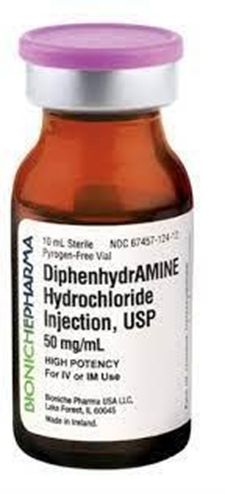A nurse is preparing to administer diphenhydramine 30 mg IM stat to a client who is having an allergic reaction. Available is diphenhydramine 50 mg/mL. How many mL should the nurse administer per dose? (Round the answer to the nearest tenth. Use a leading zero if it applies. Do not use a trailing zero.)
The Correct Answer is ["0.6"]
To calculate the dosage of diphenhydramine, the nurse needs to use the formula D/H x Q
= X, where D is the desired dose, H is the on-hand dose, Q is the quantity of the on-hand dose, and X is the amount to administer. In this case, D is 30 mg, H is 50 mg/mL, and Q is 1 mL. Plugging these values into the formula, we get:
30/50 x 1 = 0.6

Nursing Test Bank
Naxlex Comprehensive Predictor Exams
Related Questions
Correct Answer is A
Explanation
A. Standards of care published by reputable organizations, such as the Oncology Nursing Society, provide evidence-based guidelines and best practices.
B. While the experience of a nurse in a chemotherapy clinic is valuable, it may not represent standardized, evidence-based practices.
C. A qualitative study may provide insights into clients' perspectives but may not necessarily offer specific interventions for oral care.
D. Published textbooks can be valuable resources, but standards of care from professional organizations are generally more up-to-date and evidence-based.
Correct Answer is C
Explanation
A. Popliteal and femoral pulses are not typically used for assessing circulation to the brain.
B. Femoral pulse is not commonly used for assessing brain circulation.
C. The carotid pulse is commonly assessed to evaluate circulation to the brain, especially in emergency situations.
D. Radial pulse is more commonly used to assess peripheral circulation in the arm.
Whether you are a student looking to ace your exams or a practicing nurse seeking to enhance your expertise , our nursing education contents will empower you with the confidence and competence to make a difference in the lives of patients and become a respected leader in the healthcare field.
Visit Naxlex, invest in your future and unlock endless possibilities with our unparalleled nursing education contents today
Report Wrong Answer on the Current Question
Do you disagree with the answer? If yes, what is your expected answer? Explain.
Kindly be descriptive with the issue you are facing.
